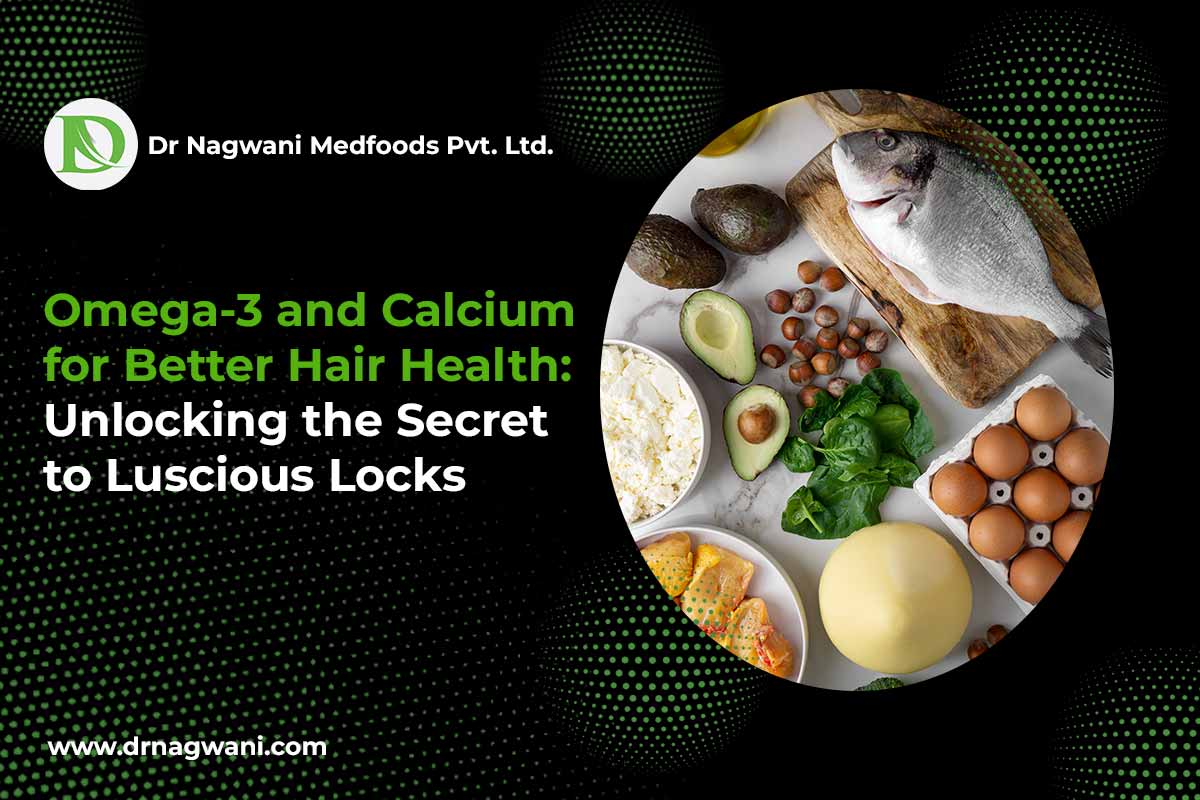Table of Contents
Introducing Omega-3 and Calcium
Achieving healthy, vibrant hair is a common goal for many, but it often requires more than topical treatments. The role of diet in promoting hair health cannot be overstated, as certain nutrients play an important role in supporting strong, shiny hair. In recent years, omega-3 fatty acids and calcium have attracted attention for their effectiveness in hair growth and hair care. This comprehensive guide examines the relationship between omega-3 fatty acid intake and calcium and how they affect hair health. We also answer the frequently asked question, “Can I take omega-3 fatty acids and calcium together for optimal results?”
Understanding Omega-3 and Calcium:
Before delving into their effects on hair health, it’s essential to understand the roles of omega-3 fatty acids and calcium in the body.
Omega-3 Fatty Acids:
Omega-3 fatty acids are polyunsaturated fatty acids that are considered essential because they cannot be produced by the body. These are primarily found in fatty fish such as salmon, mackerel, and sardines, as well as certain plant sources such as flaxseed and walnuts. Omega-3 fatty acids are known for their anti-inflammatory properties and many health benefits, including cardiovascular health, brain function, and, of course, hair health.
Calcium:
Calcium is an essential mineral for many body functions, including bone health, muscle contraction, and nerve transmission. Calcium is often associated with bone strength, but it also plays a role in hair growth and maintenance. Adequate calcium intake is essential to maintain the structural integrity of hair follicles and promote healthy hair growth.
The Role of Omega-3 and Calcium in Hair Health:
Now that we understand the importance of omega-3 fatty acids and calcium for overall health let’s explore how these nutrients specifically impact hair health.
Omega-3 for Hair Health:
Omega-3 fatty acids contribute to hair health in several ways:
- Scalp Health: Omega-3 fatty acids possess anti-inflammatory properties that can help alleviate scalp conditions such as dandruff, psoriasis, and eczema, which can contribute to hair loss and thinning.
- Promotion of Hair Growth: Omega-3 fatty acids support the hair follicle’s lifecycle, from the growth phase to the resting phase, promoting healthy hair growth and reducing hair shedding.
- Moisture Retention: Omega-3 fatty acids help maintain the scalp’s natural oils, preventing dryness and ensuring proper hydration, which is essential for healthy, shiny hair.
Calcium for Hair Health:
Calcium contributes to hair health in the following ways:
- Structural Integrity: Calcium is a crucial component of the hair shaft, contributing to its strength and resilience. Adequate calcium intake ensures that hair follicles remain strong and less prone to breakage.
- Regulation of Hair Growth Cycle: Calcium ions play a role in regulating the hair growth cycle, ensuring that follicles progress through the phases of growth, transition, and resting at the appropriate times.
- Prevention of Hair Loss: Calcium deficiency can lead to hair thinning and excessive shedding. By ensuring adequate calcium intake, individuals can help prevent hair loss and maintain healthy hair density.
Can Omega-3 and Calcium Be Taken Together?
A common question is whether omega-3s and calcium can be taken together for maximum benefit. The answer is yes. In fact, combining omega-3 fatty acids and calcium in your diet has a synergistic effect that supports overall health, including hair health. Including foods rich in omega-3 fatty acids and calcium, such as fatty fish, dairy products, leafy greens, and fortified foods, will ensure you get the benefits of both nutrients.
Conclusion:
Omega-3 fatty acids and calcium are essential nutrients that play an important role in promoting hair health. By incorporating foods rich in these nutrients into your diet and consuming enough, you will support strong, shiny hair from within. Whether you enjoy a salmon salad with walnuts or drink a glass of milk with your morning cereal, small changes in your diet can have a big impact on the health and appearance of your hair. Go ahead, nourish your hair with foods rich in omega-3 and calcium and enjoy the shiny, vibrant hair you deserve.
Frequently Asked Questions (FAQs)
Can omega-3 and calcium really improve hair health?
- Yes, both omega-3 fatty acids and calcium play crucial roles in supporting overall health, including hair health. Omega-3 fatty acids help maintain scalp health, promote hair growth, and retain moisture, while calcium contributes to the structural integrity of hair follicles and regulates the hair growth cycle.
What are some good food sources of omega-3 fatty acids and calcium?
- Foods rich in omega-3 fatty acids include fatty fish (such as salmon, mackerel, and sardines), flaxseeds, chia seeds, and walnuts. Good sources of calcium include dairy products (such as milk, yogurt, and cheese), leafy green vegetables (such as kale and broccoli), fortified foods (such as orange juice and cereals), and tofu.
How much omega-3 and calcium should I consume daily for optimal hair health?
- The recommended daily intake of omega-3 fatty acids varies depending on age, sex, and individual health status, but general guidelines suggest consuming at least 250-500 mg of combined EPA and DHA (the two main types of omega-3 fatty acids) per day. For calcium, the recommended daily intake varies by age and sex, but adults typically need around 1000-1200 mg per day.
Can omega-3 and calcium supplements help improve hair health?
- While it’s always best to obtain nutrients from whole foods whenever possible, supplements can be beneficial for individuals who may have difficulty meeting their nutrient needs through diet alone. Omega-3 supplements, such as fish oil capsules, and calcium supplements are available and can be taken to support hair health, but it’s essential to consult with a healthcare professional like Dr Anand Kumar Nagwani before starting any new supplement regimen.
Are there any side effects of consuming too much omega-3 or calcium?
- Consuming excessive amounts of omega-3 fatty acids from supplements may increase the risk of bleeding and interact with certain medications. Similarly, consuming too much calcium from supplements may lead to hypercalcemia (high levels of calcium in the blood) and increase the risk of kidney stones. It’s important to follow recommended dosages and consult with a healthcare professional if you have any concerns.
Can omega-3 and calcium be taken together, or should they be consumed separately?
- Omega-3 and calcium can be consumed together as part of a balanced diet. In fact, combining foods rich in omega-3 fatty acids and calcium can provide synergistic effects that support overall health, including hair health. Incorporating a variety of nutrient-rich foods into your diet is key to promoting optimal health and well-being.
How long does it take to see results from incorporating omega-3 and calcium into my diet for hair health?
- The timeline for seeing results from dietary changes can vary depending on individual factors such as genetics, overall health, and existing hair conditions. Some individuals may notice improvements in hair health within a few weeks of incorporating omega-3 and calcium-rich foods into their diet, while others may take longer to see noticeable changes. Consistency is key, so continue to prioritize nutrient-rich foods for long-term hair health.



